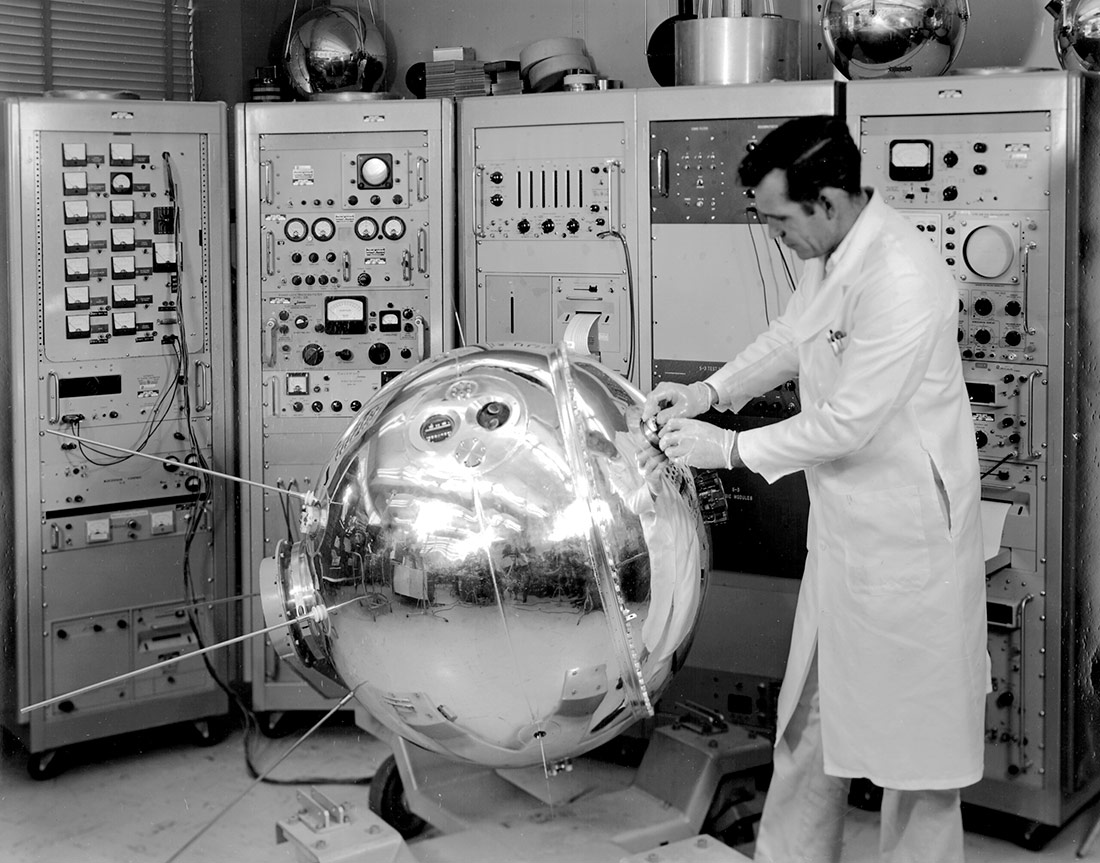
Explorer 17, 1963 | NASA, Wikimedia Commons | Públic domain
ISSS (Indonesia Space Science Society) is an open platform established in 2015 that operates within the fields of space art, astronomy, space science and space exploration. This open platform was created in response to the need for a non-profit institution driven by various independent communities from diverse disciplines. The ISSS was created from the awareness that innovation in space science and exploration is the duty and responsibility of everyone, without exception. The information gap and the digital divide in society have prompted the ISSS to work towards accelerating and enhancing understanding of ongoing space technology innovations.
Indonesia and ASEAN
ASEAN, the Association of Southeast Asian Nations, is an international organisation that operates within and comprises countries from the Southeast Asian region. As its name suggests, ASEAN is a regional organisation that serves as a platform for cooperation among 10 countries in Southeast Asia, specifically Indonesia, Singapore, Malaysia, Thailand, Vietnam, Brunei Darussalam, Cambodia, Laos, Myanmar and the Philippines. Space technology in Southeast Asia is a nascent industry with few government-led space research programmes, unlike in China, Japan and India. However, with the democratisation of spacetech, small start-ups can now enter an industry previously dominated by national space agencies. Singapore has become a crucial point and the most fertile ground regionally for space technology start-ups to grow and develop satellite platforms contributing to the advancement of global communication systems and blockchain. As a result, the space industry has attracted attention from both domestic and foreign investors.
In Indonesia, the role and activities of ISSS are focused on bringing together various scattered pieces of the puzzle. It aims to resolve the problems of bureaucratic complexities and the difficulty of collaboration between institutions and agencies, aspects which pose a challenge to the generation of a mature, simple and sustainable system.
As an official non-profit organisation, ISSS breaks through the administrative rigidity that is often found within organisational structures and formal educational institutions. ISSS seeks to generate a public feeling of confidence in Indonesia, as a great nation with various potentials in the field of space and space technology in general, and with the enthusiasm to shape the future Space Economy. Indonesia’s cultural richness, arts, hundreds of ethnic groups and thousands of languages are characteristics of a multi-layered and highly diverse society.
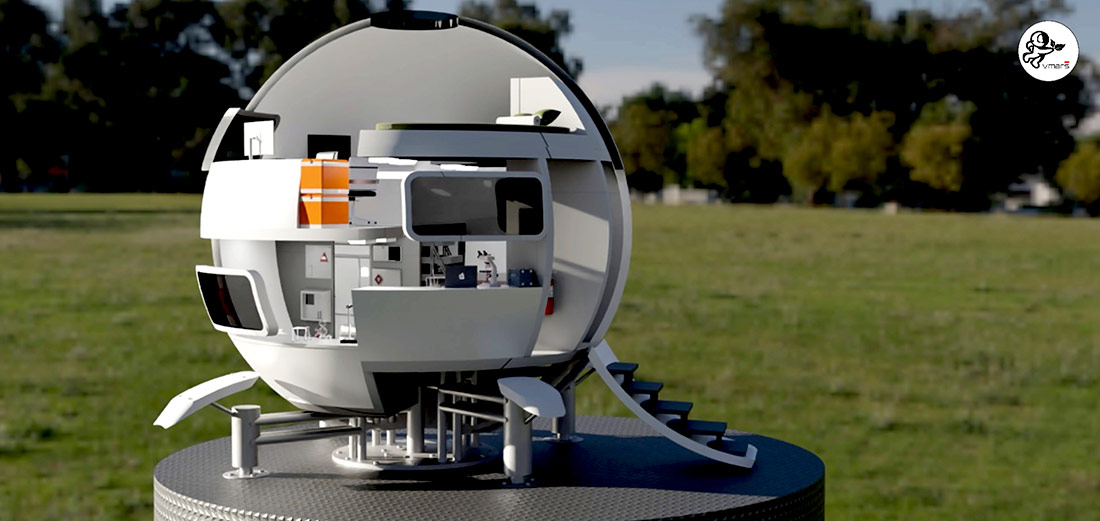
VMARS – v.u.f.o.c Mars Analogue Research Station, a project by ISSS – Indonesia Space Science Society, the first Mars Analog blueprint initiative in Southeast Asia. | ISSS and Venzha Christ, 2020
VMARS: a Mars Analog
One of ISSS’s flagship projects is VMARS – v.u.f.o.c Mars Analogue Research Station, a blueprint for the first Mars Analog development in Southeast Asia to be built in Indonesia.
ISSS started developing its VMARS blueprint in 2020 after participating in the first Planet Mars life training programme, namely the Mars Desert Research Station (MDRS) Project by the Mars Society (part funded by the MUSK Foundation and Elon Musk from SpaceX), in the US in 2018, as well as the Simulation of Human Isolation Research for Antarctica-based Space Engineering (SHIRASE) programme organised by the organisation FIELD Assistant in Japan in 2019.
The construction of VMARS is a collaboration involving five elements: government, universities, practitioners, the private sector and the space community. VMARS is a tangible pilot project aimed at developing alternative and independent education in the fields of Space Science and Space Exploration in Indonesia and Southeast Asia. To date, VMARS has been presented and showcased in Japan, the United States, Korea, Taiwan, Singapore, Thailand and France. The main programmes in the first phase of VMARS include terraforming research (V-TF), introduction to space farming (V-SFM) and alternative space food creation (V-SF).
VMARS represents a significant milestone in Southeast Asia due to the fact that Indonesia has no deserts or extremely cold terrains. A tropical region with lush greenery, it is vastly different from conditions resembling those on the planet Mars, unless the research station were to be built at the top of a mountain. However, this would be highly risky considering that Indonesia has an active volcanic belt within the “Ring of Fire.” This fact has prompted ISSS to turn its attention in another direction and look at the question of how to create alternative space food for interplanetary travel, an idea that has driven collaboration among universities and institutions in the field of technology, which have contributed their abilities and talents to the project.
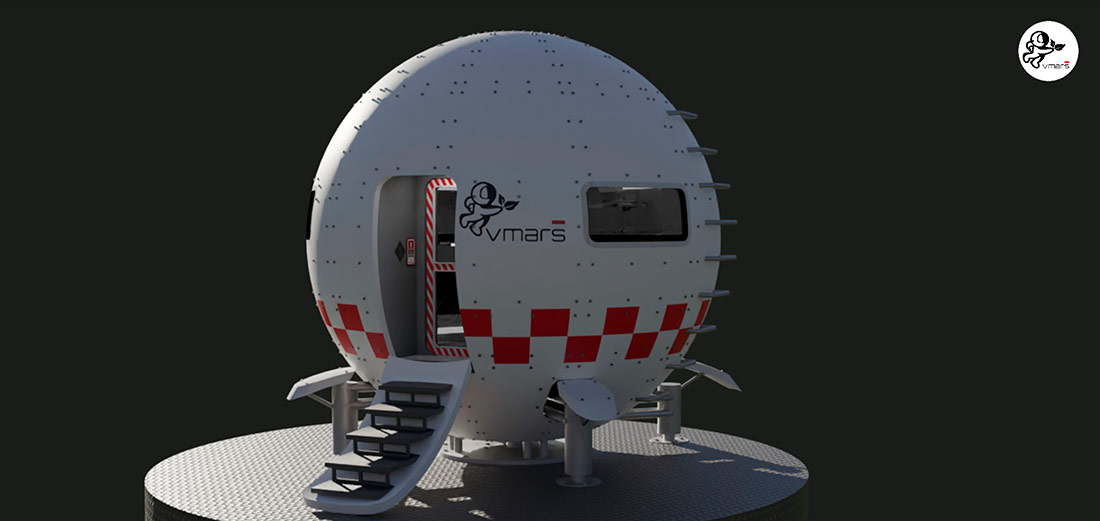
VMARS – v.u.f.o.c Mars Analogue Research Station, a project by ISSS – Indonesia Space Science Society, the first Mars Analog blueprint initiative in Southeast Asia. | ISSS and Venzha Christ, 2020
Indonesia’s First Space Food Innovation Project
Indonesia is the world’s largest archipelagic country, with 17,508 islands inhabited by more than 360 ethnic groups and a population of 279,072,446 (2024). This makes Indonesia rich in cultural diversity and traditions, as well as boasting incredibly beautiful natural landscapes, complemented by a variety of tantalising culinary delights. One component of Indonesia’s biodiversity is mushrooms. Gandjar et al. (2006) estimated that there are approximately 200,000 mushroom species that can be found in Indonesia out of a total of 1.5 million species worldwide. However, records regarding the biodiversity of mushrooms in Indonesia have not been fully documented.
It is this abundant biodiversity in Indonesia’s tropical environment, and especially mushroom species, that prompted ISSS to collaborate with various universities and practitioners to create the space food program V-SF as part of the VMARS project. It is expected that this interdisciplinary collaboration will enable Indonesia to fulfil its dream of actively participating in the development of space science and space exploration at the global level.
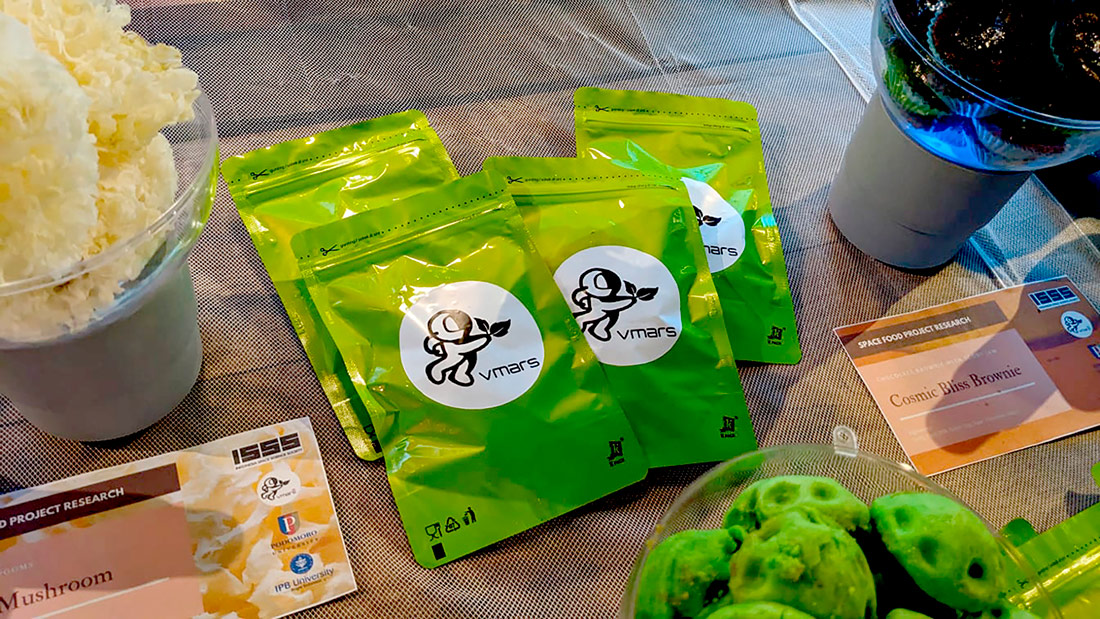
The V-SF Space Food project, one of the main VMARS programmes by ISSS – Indonesia Space Science Society, collaborates with several universities and institutions. | ISSS and Venzha Christ, 2023
International SETI Conference
How can imaginings about the vastness of the universe and the boundless exploration that could be undertaken by humans be easily and simply conveyed to society?
SETI (Search for Extraterrestrial Intelligence) strives to address the question of whether humanity is alone in the universe. Employing diverse methods, SETI seeks to detect indications of technological activity originating from other planets, including the analysis of radio transmissions and optical signals.
In 2016, ISSS launched a multidisciplinary initiative in the field of SETI (and METI – Messaging Extraterrestrial Intelligence) to invite researchers and experts from around the world to come together and share their knowledge every year in Indonesia, under the name of the International SETI Conference.
This conference is framed within ISSS’s efforts to build historical awareness and envision the future of humanity and all species, while contemplating the meaning of existence and the current state of our civilisation. Furthermore, SETI invites us to imagine and answer the question of whether we are alone in this vast universe.
The International SETI Conference is an event that welcomes participants from diverse fields such as sciences, arts, traditions, astrophysics, astronomy, space science, humanities and other contemporary areas of study. It serves as a platform for sharing experiences in confronting the unknown and exploring its impact on human culture and spatial imagination. Attendees are encouraged to showcase experiments or projects that facilitate encounters with the unknown and foster interactions with others. The conference also provides an opportunity for on-site experimentation with the unknown, allowing attendees to actively participate in symposium activities.
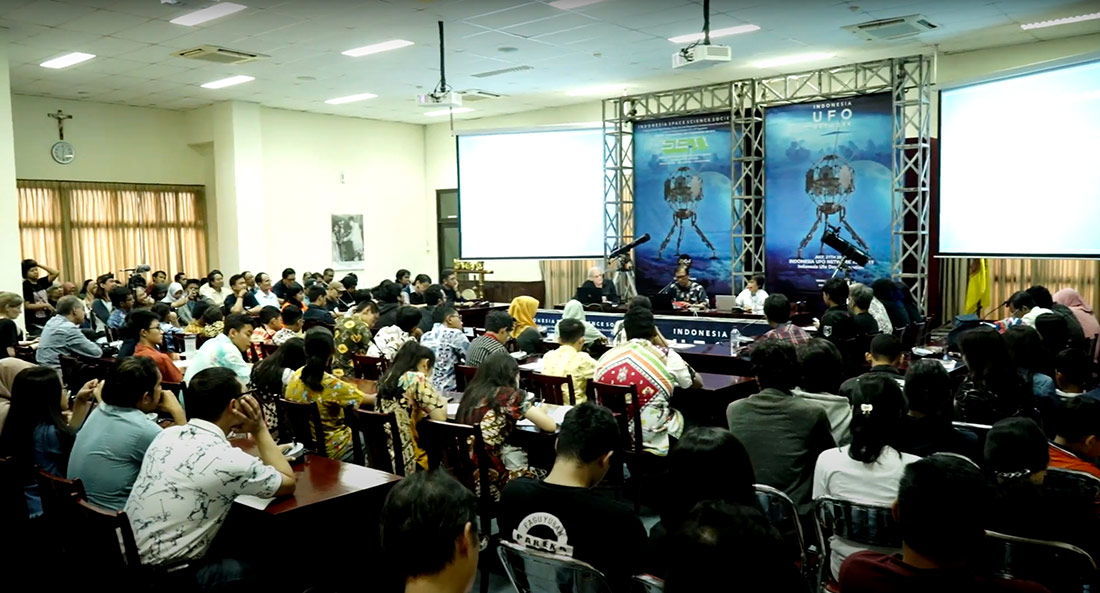
The International SETI Conference, Yogyakarta, Indonesia, organised by ISSS – Indonesia Space Science Society; the annual Indonesia UFO Festival, a festival for Space Science, SETI, UAP, Extraterrestrial and Space Art. | ISSS and Venzha Christ, 2023
Kampung Alien (Alien Village) as a Genuine Laboratory
How can the process of learning and sharing be easily facilitated? The answer is quite simple: by creating a space and subject that can directly engage with the community. ISSS initiated a pilot project called “Kampung Alien” (Alien Village), a simple place in a village far removed from the hustle and bustle of humanity’s space exploration race.
Kampung Alien is essentially an open-air natural laboratory for the development and study of Astronomy, Space Science and Space Exploration in a rural, organic setting that is integrated with the village community and forms an ecosystem that directly involves the grassroots, bridging the gap in technological information and innovation movements.
Kampung Alien was officially inaugurated in July 2023 as part of the Indonesia UFO Festival 2023, coinciding with the celebration of Indonesia UFO Day which is held every 21 July. Various activities to introduce and educate about Mars exploration are being carried out on an ongoing basis in this natural laboratory, involving various community elements and in collaboration with diverse communities and related institutions.
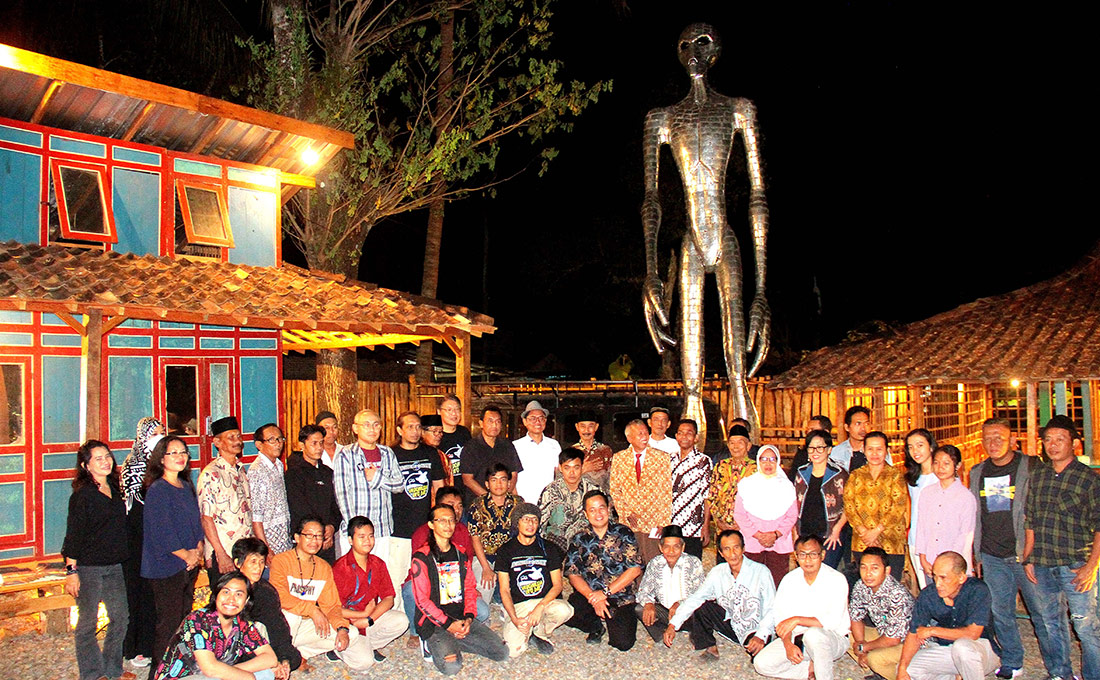
Kampung Alien, an Open-air Natural Laboratory for the development and teaching of Astronomy, Space Science and Space Exploration in a rural setting. | ISSS and Venzha Christ, 2023
Fostering Local Expertise
The role of independent communities, start-ups, practitioners and space science enthusiasts is crucial in accelerating the dissemination of information and the advancement of space technology in the Southeast Asian region. The involvement of governments in each country is perceived as inadequate compared to the pace of other regions worldwide, all competing to achieve the best in the era of the space race.
Vietnam is currently operating the VNREDSat-1 project in collaboration with France, an observation satellite successfully launched in 2013. In 2007, Sheikh Muszaphar Shukor became the first Malaysian to fly into space as part of a scientific mission to the International Space Station (ISS). And in 2017, Indonesia became the first country in mainland Asia to send experiments to the ISS as part of a project to study the impact of microgravity on the growth of tempeh, a traditional fermented soybean food. Furthermore, in 2018, MuSpace Thailand launched an 8 kg payload, including local university experiments, on Blue Origin’s New Shepard rocket, marking their first journey into space. Also, start-ups including SpaceIn, NuSpace, Equatorial Space, SpaceChain, Transcelestial, SpeQtral, Aliena and many others in the region are attracting international collaborations and driving regional initiatives.
Recently, the exhibition “Mars. The Red Mirror” was held at the ArtScience Museum in Singapore from November 2023 to April 2024. Curated by Juan Insua and presented by the ArtScience Museum and the Centre de Cultura Contemporània de Barcelona (CCCB), this exhibition showcased various space projects, highlighting the need for broader international collaboration to enhance advancement and acceleration in Southeast Asia.
In summary, the Indonesia Space Science Society (ISSS) plays a crucial role in accelerating the advancement of space technology in Southeast Asia, particularly in Indonesia. Through initiatives like VMARS, the International SETI Conference and Kampung Alien, ISSS fosters local expertise and encourages collaboration among independent communities, start-ups, practitioners and space science enthusiasts. Despite perceived governmental inadequacies in comparison to global counterparts, recent achievements such as Indonesia’s participation in space missions and regional projects like VNREDSat-1 and MuSpace demonstrate Southeast Asia’s growing involvement in the space industry. The exhibition “Mars. The Red Mirror” underscores the importance of international collaboration for regional advancement. ISSS remains committed to facilitating cooperation between governments, educational institutions and the private sector to ensure sustainability and maximise the potential of communities and academia in shaping the future of space exploration.


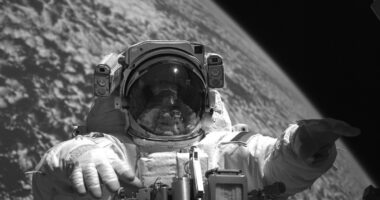
Leave a comment